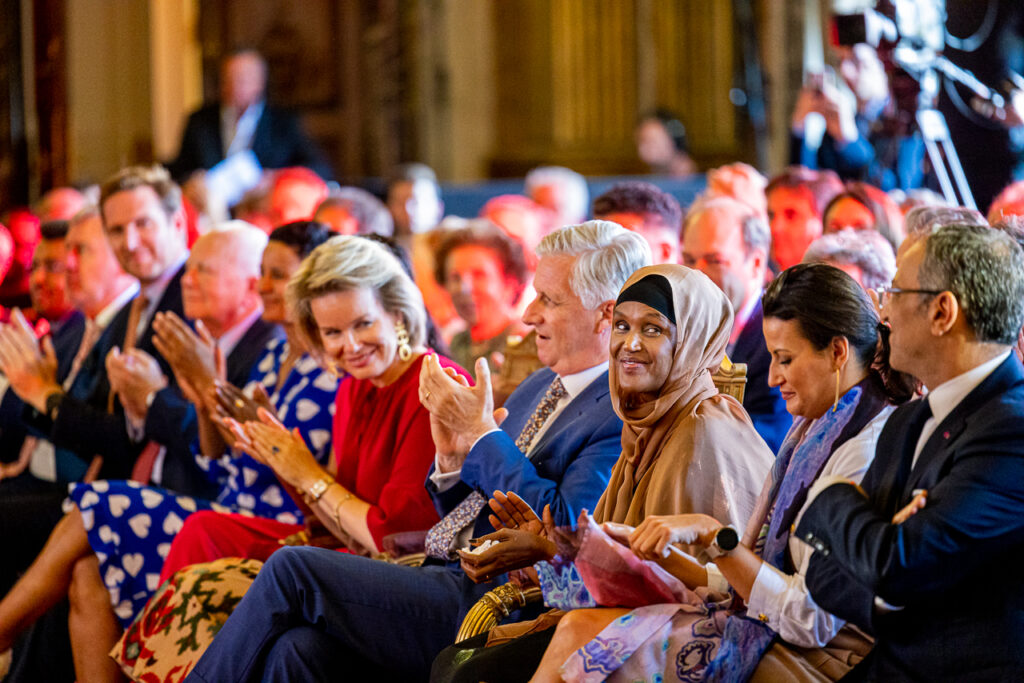Elman Peace of Somalia received the KBF Africa Prize 2020-21 on Thursday, 16 June, in the presence of King Philippe and Queen Mathilde. The award recognises the organisation’s successful efforts to combat violence and promote social justice in Somalia and beyond. Its record of empowering and cultivating leadership skills among women and young people is outstanding.

The KBF Africa Prize committee at the King Baudouin Foundation believes solutions adopted by Elman Peace in Somalia over the past 30 years have the potential to inspire other societies – in Africa and beyond – to put conflict behind them and find and follow a more inclusive path.
“In striving to build peace amid Somalia’s long civil conflicts, Elman Peace has developed powerful tools that offer examples to us all. Fartuun Adan and her daughter Ilwad Elman have shown how working with individuals and communities at the grass roots can build a better future,” KBF Vice-chair Yasmine Kherbache said in making the award in the presence of King Philippe.
“Founded by their late husband and father Elman Ali Ahmed, Elman Peace has helped thousands of young Somalis rebuild peaceful lives after being drawn into violence.”
Noting the scale of challenges facing Somalia today, as climate change drives a devastating drought which threatens renewed instability, Ilwad Elman, chief operating officer of the Mogadishu-based non-profit, said recognition from the Foundation was greatly valued by the Elman Peace team.
“Peace is so much more than the absence of war,” she said. “It is about community; it is enabling an environment where people can meet their true potential and have the opportunity to pursue the best versions of themselves. True and sustainable peace can be reached when people are also at peace with themselves, and I believe this is within reach, now more than ever before, in Somalia.”
The organisation, and the family behind it, have shared in the sufferings of fellow Somalis. Fartuun Adan fled her homeland with three young daughters. Her husband remained to continue his mission and was murdered for it in 1996. Ten years later, Adan returned from refuge in Canada to resume his work and was followed by their children. Their eldest daughter, Almaas, was also killed, in 2019.
Now with more than 200 people based in Mogadishu and eight regional branches across Somalia, Elman Peace has a range of programmes, run locally by young, committed, and professional teams, working closely with their communities.
Notable among these is Drop the Gun, Pick up the Pen to draw children and teenagers away from armed groups by providing education.
“Education is not a commodity, and in Somalia it is still 100% privatised,” said Fartuun Adan. “Through the free education programmes we run, we have seen the transformational impact it can have, particularly youth leaving armed groups. We have had some young people in our programmes who had never touched a pen before they came to us, and now they are going to university. It shows that if you make an effort, people can change – they just need the opportunity.”
“What we are trying to do in our work is restore trust,” said Ilwad Elman. “Trust in systems, trust in government, non-partisan trust between people who don’t have any other connection to each other – free from tribalism and past affiliation. Young people who have been ostracised from the community, who have been labelled as dangerous, we’re trusting them by bringing them into our programmes and they’re trusting us by going through the various initiatives we prescribe.”
With Sister Somalia, Elman Peace has provided the first rape crisis centres Somalia. The She Will programme delivers resources for educating teenage girls. Elman Peace also sets store by care for the mental wellbeing of those affected by conflict, offering therapies that include meditation, yoga and sport.
It aims to use some of the KBF award to further develop care programmes for frontline peace activists.
To stay informed about news from our partners and new calls for proposals
Subscribe to the newsletter